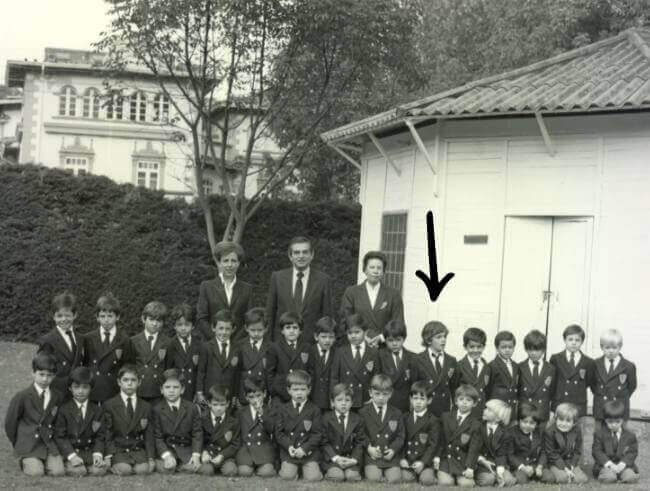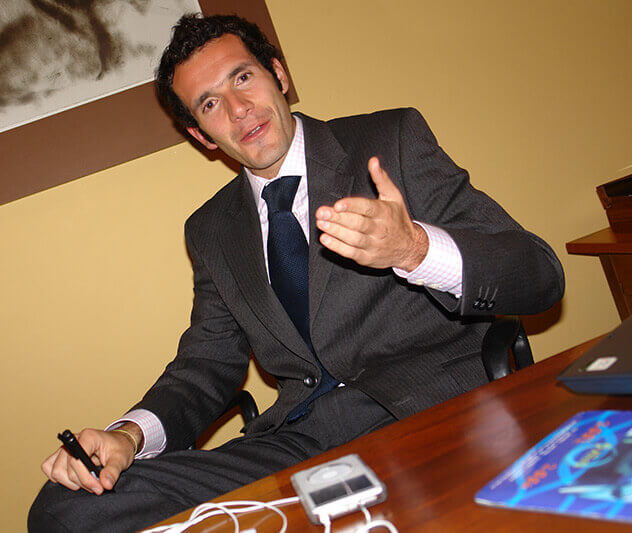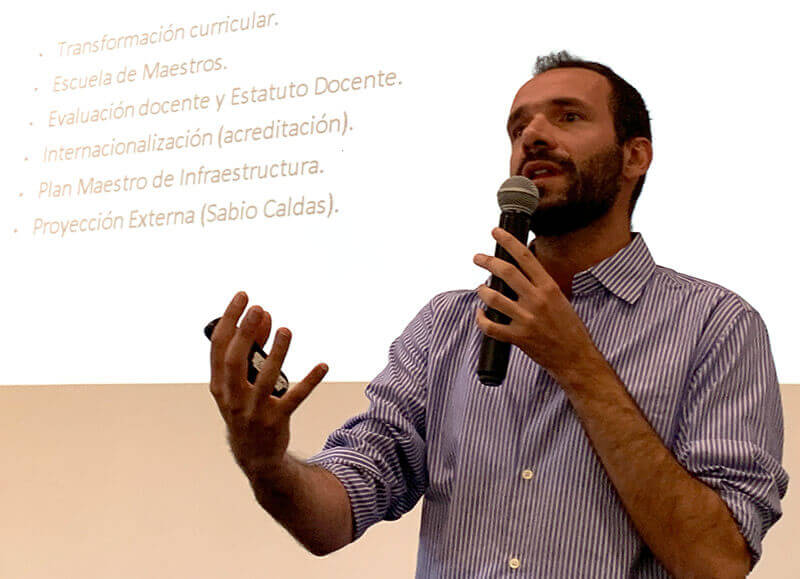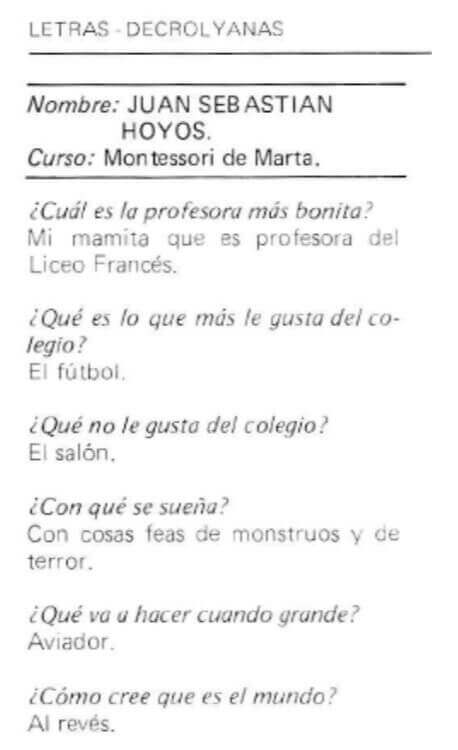On the sunny morning of Tuesday, February 4, 1986, Juan Sebastián Hoyos Montes stepped for the first time on the green lawns of Gimnasio Moderno. He did it hand in hand with his parents, Mr. Bernardo Hoyos Pérez and Mrs. Constanza Montes Vicaría. A premonition invaded the child and made him foresee a destiny eternally intertwined with the essence of his school.
That same premonition took shape on March 18, 2024, when Carl Langebaek Rueda, president of the Superior Council, announced to the gymnasium community that Juan Sebastián, 42 years old, had been elected to assume the position of rector after the conclusion of the third term of Víctor Alberto Gómez Cusnir, on July 23 of the same year.
A few weeks after his arrival at the Gimnasio, while playing soccer with his classmates, Juan Sebastián was approached by some older students. They proposed him an interview for the magazine El Aguilucho, a publication of which he would become director in his last school year, in 1998, thanks to his passion for literature and culture that he breathed at home.
With hoarse voices, like his father’s, the elders asked him, “Which is the prettiest teacher?”. To which he, demonstrating that his gaze always transcends borders, replied, “My mommy, who is a teacher at the Lycée Français.”
They continued probing: “What do you like most about school?” they asked. “Soccer,” he answered without hesitation. His passion for this sport lasted throughout the years. He was a member of the senior national team – in which he played as a classic 10 – and has been an irremediable fan of Millonarios, his favorite national team, and, above all, of his beloved Real Madrid in the European League. He shared this passion with the educational community through La Cúpula Deportiva, a program he hosted at the school radio station, Radio Gimnasio Moderno, during high school.
When asked about what he liked least about school, Juan Sebastian thought for a few seconds before answering, “The classroom.” His answer did not reflect academic apathy. In fact, his attitude was quite the opposite. Since Montessori I, “he distinguished himself by his cheerfulness and collaboration. She was concerned during the last weeks to complete her work and obtained good results,” as her teacher Martha Barrios de Cano noted in her first report card.
It was already foreshadowed that his profile would be framed within the principles of the Gymnastic Spirit and the Discipline of Trust. His Decroly room director, Marcela Arbeláez, described him as “enthusiastic and with a great sense of humor”. She added: “He enjoys great acceptance within the group, thanks to the fact that he is a very good classmate. He participates positively, critically and respectfully in round tables and debates. He also assumes his responsibilities with pleasure”.
Cecilia Hernandez, her fifth grade Decroly teacher, remarked: “She is cheerful and shows great interest in her work. She stands out for her gentlemanliness and kindness. He has excellent abilities and manages to analyze and synthesize information correctly on the proposed topics.”
Perhaps his unusual answer about his least favorite place in the school was also a foreshadowing of his future pedagogical proposals. As vice rector, 27 years later, in 2013, he drove the transformation of the Gimnasio with initiatives such as the implementation of positive psychology, emotional education and well-being, self-knowledge, character strengths and human values training, among others, with which he landed in practice the founding principles of the institution. These initiatives earned him a very special recognition. In 2021, the Positive Education Program, created by him, was recognized by the IPEN International Education Network as a world reference, along with thirty other schools from all continents.
An educator who is convinced that education must be transformed so that its purpose is not to achieve results in standardized tests, but to help forge lives full of meaning, fulfillment and contribution to society. Therefore, he believes that education should be active, focused on reflection, where children vibrate with their learning, wonder about the world and can provide solutions to their concerns through cooperative work and inquiry, as critical citizens in a globalized society.
The interview continued, and although Juan Sebastian was eager to resume the soccer game, a new question stopped him: “What do you dream about? Evoking images that reside in the unconscious of any child, he answered, “Ugly things about monsters and terror.”
Since then he seems to have taken as a personal mission the confrontation against inner ghosts: he became a strong advocate of the importance of self-knowledge, inner work to become a better person, the development of consciousness and spiritual growth, understood as the search for meaning beyond material values, with the aim of broadening the horizons of common welfare, a purpose that he has been able to develop mainly thanks to Eastern philosophy and his spiritual teacher.
Today he dreams of a Modern Gymnasium that must continue with its renovation process and its international projection without forgetting its origins and identity. He aspires for healthy coexistence to be the core of the school experience and for teacher training to continue to be the transforming axis of the institution (because “Whatever the teacher is, the school will be”). He dreams of a better understanding of the impact of artificial intelligence on education and of a closer accompaniment of families in the education of their children. He ambitions to move forward with the construction of a new building for the Preschool, as part of the Master Plan under development, and with a school where girls can now develop their full potential and teach boys to be more empathetic. And she dreams, above all, of ‘raquetazos’ full of dialogue, humor, understanding, warmth, friendship and freedom, in the midst of sunny afternoons and pine trees.
hen asked what he wanted to be when he grew up, he answered without hesitation: “An aviator. An answer that, in time, would demonstrate his understanding that piloting Gimnasio Moderno is a challenging task. And even more so when the outgoing rector’s management has set very high standards. Therefore, his flight log will focus on continuing with those reforms -which are progressing very well- but, at the same time, on projecting even more the humanism and free thinking that characterizes the school, with a strong focus on the development of the students’ character, based on values and virtues. His intention is to enhance the strengths of each student so that each of them build their self-esteem and their life from their talents and passions.
At the end of the interview, the journalists asked: “What do you think the world is like?” Reflective, little Juan Sebastián, thinking like a big boy, answered: “Upside down”. This perception proves even more pertinent in today’s context, with a world on the brink of a third world war, emerging from a pandemic that tested human resilience and empathy, challenging the ability to come together as a species to evolve.
Thus worked the mind of the boy who, 38 years later, will assume the rectorship of the most magical school we know. A true gymnast who continues to demonstrate the same qualities highlighted by teacher Maximiliano Fernández in eighth grade: “the righteousness in his actions, the deep respect for people and nature, the responsibility with which he assumes his duties and commitments, his admirable ability to adapt to life’s situations and circumstances, his deep sense of solidarity and companionship, his permanent good humor and his excellent gymnastic spirit”.
Perhaps because of all these virtues, which today continue to flourish in his personality, he was deserving of several recognitions since he was a child: in 1987 he was nominated for the Excursionism Plaque, in 1991 for the Beautiful Character Plaque, in 1996 for the Personal Effort Cup and, in 1997, he won the Beautiful Character Plaque, which he recognizes as one of the most significant achievements of his life. This plaque was received from the hand of Don Guillermo Quiroga, one of his most beloved teachers, along with Myriam Bustamante and Nelson Cuervo, Pompilio Iriarte, Jorge Salazar, Alberto Gerardino, Vilma de Bernal, Juan Carlos Bayona, Martha Figueroa, Carlos Cardona and Edgar Obonaga, among many others, who left a mark on his character.
Finally, the greats finished their report and let him return to the game that was being played. At that moment, the knocking on the bronze bell that hangs in the Main Building marked the end of recess, and then Juan Sebastián dreamed of his future. He wished someday to be the one to interview the children of the school. His dream materialized years later, when he joined the editorial team of the primary school magazine El Pichón, in which he published an interview with Father Rafael García-Herreros, entitled “A Symbol of Peace”. A report on the priest who played a fundamental role in the terrible war that the country was going through at that time due to drug trafficking.
Juan Sebastián’s education and universality can be seen in his law studies at the Universidad de los Andes, his specialization in Administrative Law at the Universidad del Rosario, his specialization in Management of Educational Institutions at the Universidad de los Andes and his master’s degree in Socioemotional Education and Wellbeing at the RIEBB, directed by Dr. Rafael Bisquerra, along with other studies and work in England, France, Italy and the United States. All these achievements have not changed his essence. He is a simple man who believes in academic experience, but, above all, in human beauty, inner strength, life experience and personal strengths.
In 2021, his ability to lead in the educational field was recognized by a sister school, Tilatá, which invited him to be its rector. This experience would further prepare him to take on the challenges of Gimnasio Moderno with greater richness.
Juan Sebastián returned to his classroom along with his classmates. He committed himself to his obligations and took care to prepare himself for life as he instills it today in his daughter Lucia, 5 years old, who is the great motivation of his existence, and who will surely be very proud to know that her father is the rector of the school where he has always been happy. As will be Cristina Davila, his girlfriend, a wonderful woman with a great sense of humor, who is a fundamental support in his life; his mother, an example of generosity, intelligence and faith; his family and friends.
As was his teacher Cecilia Hernandez, when she wrote the following about him: “We are proud to have had him this year,” she said. And she added that he was “the student with the highest academic performance of the course, the responsibility and seriousness shown in all his activities are worthy of praise. We are sure that this is the successful beginning of a student who will leave footprints worthy of imitation in the Gymnasium. Congratulations.
Throughout Juan Sebastian’s school life, his teachers also foretold that his destiny would be linked to the school. Now that he has become a principal, it is clear that there is no one who knows a student’s future better than a good teacher.








